2011年高考英语(人教版)要点梳理+重点突破:必修2 Unit 5 Music
- 格式:doc
- 大小:127.50 KB
- 文档页数:19
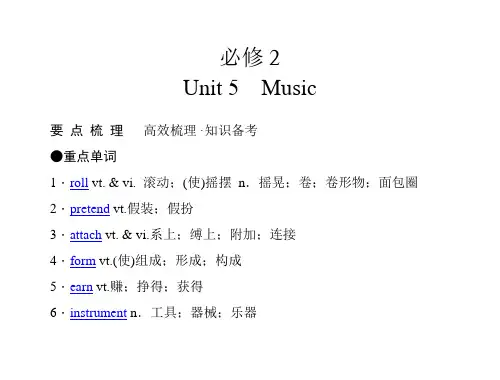
必修2Unit 5Music要点梳理高效梳理·知识备考●重点单词1.roll vt. & vi. 滚动;(使)摇摆n.摇晃;卷;卷形物;面包圈2.pretend vt.假装;假扮3.attach vt. & vi.系上;缚上;附加;连接4.form vt.(使)组成;形成;构成5.earn vt.赚;挣得;获得6.instrument n.工具;器械;乐器7.passer by n.过路人;行人→passers by (pl.)8.perform vt. & vi.表演;履行;执行→performance n.表演;演奏9.broadcast n.广播;播放vi. & vt.广播;播放10.humorous_ adj.幽默的→humor n.幽默11.familiar adj.熟悉的;常见的;亲近的12.attractive adj.吸引人的;有吸引力的→attract vt.吸引→attraction n.吸引,吸引力13.afterwards adv.然后;后来14.sensitive adj.敏感的;易受伤害的;灵敏的15.confident adj.自信的;确信的→confidence n.自信●重点短语1.dream of梦见;梦想2.to be honest 说实在的3.attach...to附上;认为有(意义) 4.in cash 用现金5.play jokes on戏弄6.rely on依靠;依赖7.be/get familiar with熟悉8.or so大约9.break up打碎;分裂10.in addition 另外,也11.sort out分类12.above all 最重要;首先13.be based on以……为基础14.be serious about对……认真15.by cheque 用支票16.stick to坚持●重点句型1.Freddy and his band could not go out anywhere without being followed弗雷迪和他的乐队走到哪里都会有人跟随。
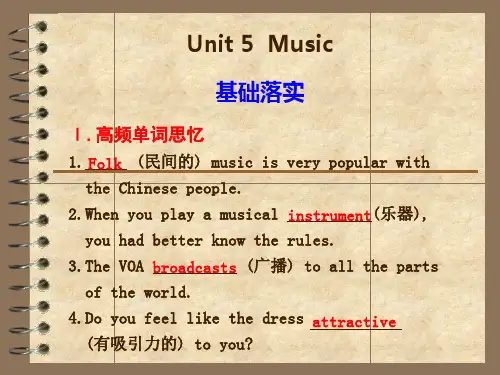
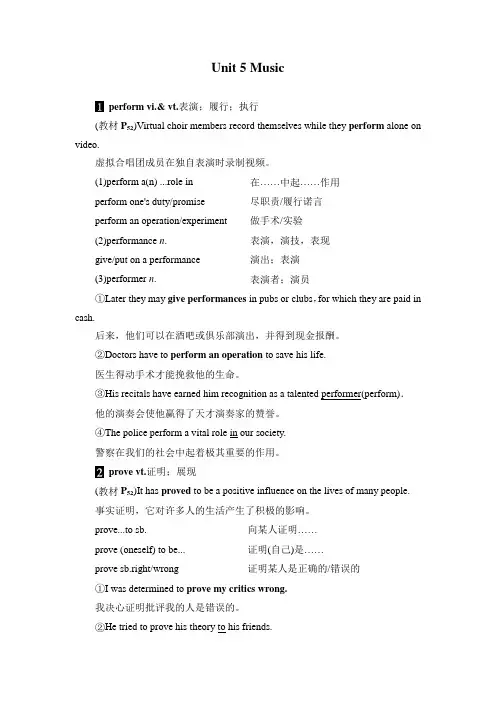
Unit 5 Musicperform vi.& vt.表演;履行;执行(教材P52)Virtual choir members record themselves while they perform alone on video.虚拟合唱团成员在独自表演时录制视频。
(1)perform a(n) ...role in在……中起……作用perform one's duty/promise 尽职责/履行诺言perform an operation/experiment 做手术/实验(2)performance n. 表演,演技,表现give/put on a performance 演出;表演(3)performer n. 表演者;演员①Later they may give performances in pubs or clubs,for which they are paid in cash.后来,他们可以在酒吧或俱乐部演出,并得到现金报酬。
②Doctors have to perform an operation to save his life.医生得动手术才能挽救他的生命。
③His recitals have earned him recognition as a talented performer(perform).他的演奏会使他赢得了天才演奏家的赞誉。
④The police perform a vital role in our society.警察在我们的社会中起着极其重要的作用。
prove vt.证明;展现(教材P52)It has proved to be a positive influence on the lives of many people.事实证明,它对许多人的生活产生了积极的影响。
prove...to sb.向某人证明……prove (oneself) to be... 证明(自己)是……prove sb.right/wrong 证明某人是正确的/错误的①I was determined to prove my critics wrong.我决心证明批评我的人是错误的。
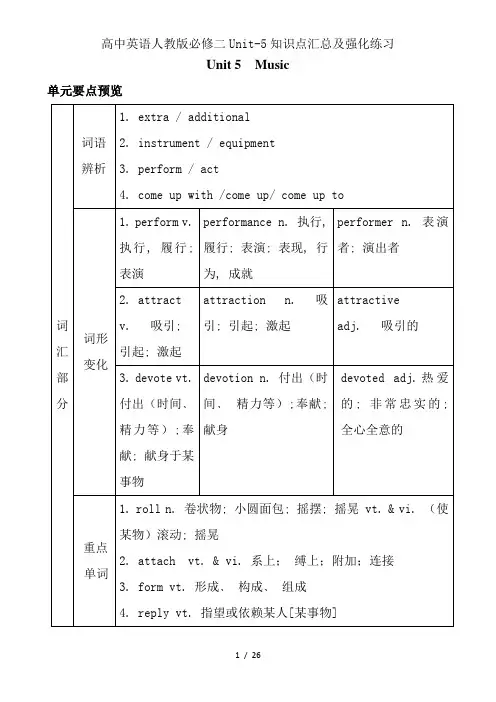
Unit 5 Music 单元要点预览Ⅰ 词语辨析Ⅱ 词性变化Ⅲ 重点词汇1. roll n. 卷状物; 小圆面包; 摇摆; 摇晃 vt. & vi. (使某物)滚动; 摇晃[典例]1). The slow, steady roll of the ship made us feel sick.船老是晃晃悠悠的, 弄得我们很恶心。
2). Six brown rolls, please. 请给我来六个黑面包。
[重点用法]roll sth up(将某物)卷或绕成球形或圆柱形; 卷起(某物)roll in 滚滚而来; 大量涌来[练习] 中译英1). 仍不断有人提出愿予以帮助。
________________________________________________________________ ________________2). 他总是抽自己卷的烟.________________________________________________________________ ________________2. attach vt. & vi. 系上;缚上;附加;连接[典例]1). He will attach a label to each piece of luggage. 他会把每件行李上都加上标签。
2). Do you attach any importance to what he said? 你认为他说的话重要吗?[重点用法]attach (sth.) to(sth.)将某物系在、缚在或附在(另一物)上attach to sb. / sth. 及某人相关联; 归于某人[练习] 中译英1). 这件事不怪你。
________________________________________________________________ ________________2). 信中附一文件。
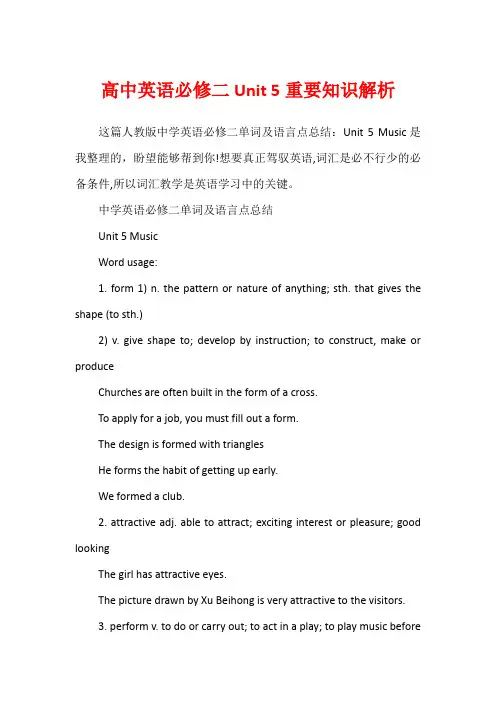
高中英语必修二Unit 5重要知识解析这篇人教版中学英语必修二单词及语言点总结:Unit 5 Music是我整理的,盼望能够帮到你!想要真正驾驭英语,词汇是必不行少的必备条件,所以词汇教学是英语学习中的关键。
中学英语必修二单词及语言点总结Unit 5 MusicWord usage:1. form 1) n. the pattern or nature of anything; sth. that gives the shape (to sth.)2) v. give shape to; develop by instruction; to construct, make or produceChurches are often built in the form of a cross.To apply for a job, you must fill out a form.The design is formed with trianglesHe forms the habit of getting up early.We formed a club.2. attractive adj. able to attract; exciting interest or pleasure; good lookingThe girl has attractive eyes.The picture drawn by Xu Beihong is very attractive to the visitors.3. perform v. to do or carry out; to act in a play; to play music beforepublicThe young doctor performed the heart operation.The students will perform an opera next Friday.The soloist had never performed in London before.Our team performed well in the match yesterday.4. ability n. skill; capability or power to do sth.She did the work to the best of her ability.He is a man of great ability.The acting abilities of both are well-known.5. advertisement n. public note (esp. in newspaper or TV) to arouse the publics attention about a product or ideaAdvertisement helps to sell goods.You can always see a lot of advertisements in the newspaper.Your job is dealing with advertisements.6. musician n. someone who is talented at composing or performing musicHe wants to be a great musician in the future.Her mothers friend, Miss Chen, is a well- known musician.It seems that musicians always keep long hair.7. reputation n. great opinion about a persons character; state of being respectedThe store has an excellent reputation for fair dealing.This restaurant has a fine reputation.Cheating in the game ruined that players reputation.8. sort 1) n. kind; person or specified personality2) v. arrange according to different categories such as class, kind or sizeAll sorts of lamps are available in that shop.Thats just the sort of thing I want.They sort apples by size.Cant you sort the good from the bad?9. clap 1) n. the action or sound of hands-clapping; a high-pitch noise of thunder2) v. to strike together with handsThey gave the speaker a clap.A clap of thunder reverberated through the house.The audience clapped the pianist heartily.10. roll 1) n. sth rolled up, such as paper; things with this shape; list of names2) v. to move by turning over and over; to form into cylindrical or spherical shape; (of earth) to extend as in a wave; (to cause to) sound with long, vibrating tone; to swayPlease buy a roll of film for me.The roll of thunder was deafening.She rolled up her sleeves and began to prepare for supper.The truck rolled on at full speed.The coin rolled under the bed.The boat rolled badly.11. sayinga well-known wise statementThere is no smoke without fire, as the saying goes.Read some of the following sayings, then write your own famous quote about music and what it means to you.Useful expressionsdream of \ about (doing) sthimagine sth would come trueHave you ever dreamt of being in front of thousands of people at a concert, with everyone clapping and enjoying your singing?He dreams of becoming a sailor.He got the first place this time, but he never dreamt about that.1. be honest withtell what exactly what one thinksto be frank withIf we are honest with ourselves, most of us have dreamed of being famous.I shall be quite honest with you.If you are honest with others, they will help you a lot.2. play a joke on \ with sb = play jokes on \ with sbThe musician of whom the bank was formed played jokes on each other as well as played music.They were playing jokes on each other while drinking.Take it easy, he is only playing a joke with you.3. or soItll only cost 15 dollars or so.There were twenty or so.Our manager will be back in a month or so.4. break upgo away in different directionsHowever, the bank broke up in about 1970, but reunited in the mid-11010s.The police tried to break up the crowd.The two friends broke up.Nearly three hours later, the meeting finally broke up.5. by chanceby accidentI met my classmate in the street by chance.He got the money in the room by chance.I found my lost watch by chance yesterday.6. sort outto separate from a mass or group; to put things in order; place according to kind, rank, etc.; arrangePlease sort out the papers to be throw away, and put the rest back She got a job sorting out letters in the Post Office.Some of the massages are getting mixed up. Can you sort them out?7.stick toYou should stick to your dream.Stick to the task until it is finished.Make a special time for practicing and stick to it.He never sticks to anything for long.8. above allmost important of allAnd above all, remember to send us your commentsAbove all, you should be honest with me right now.。
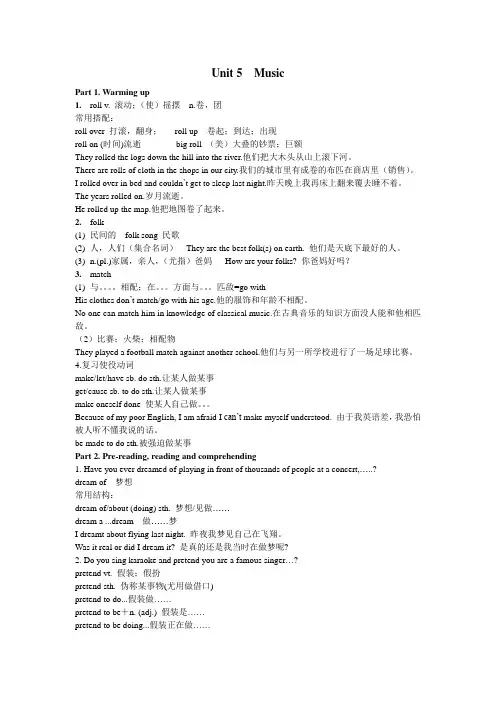
Unit 5 MusicPart 1. Warming up1.roll v. 滚动;(使)摇摆n.卷,团常用搭配:roll over 打滚,翻身;roll up 卷起;到达;出现roll on (时间)流逝big roll (美)大叠的钞票;巨额They rolled the logs down the hill into the river.他们把大木头从山上滚下河。
There are rolls of cloth in the shops in our city.我们的城市里有成卷的布匹在商店里(销售)。
I rolled over in bed and couldn’t get to sleep last night.昨天晚上我再床上翻来覆去睡不着。
The years rolled on.岁月流逝。
He rolled up the map.他把地图卷了起来。
2.folk(1)民间的folk song 民歌(2)人,人们(集合名词)They are the best folk(s) on earth. 他们是天底下最好的人。
(3)n.(pl.)家属,亲人,(尤指)爸妈How are your folks? 你爸妈好吗?3.match(1)与。
相配;在。
方面与。
匹敌=go withHis clothes don’t match/go with his age.他的服饰和年龄不相配。
No one can match him in knowledge of classical music.在古典音乐的知识方面没人能和他相匹敌。
(2)比赛;火柴;相配物They played a football match against another school.他们与另一所学校进行了一场足球比赛。
4.复习使役动词make/let/have sb. do sth.让某人做某事get/cause sb. to do sth.让某人做某事make oneself done 使某人自己做。
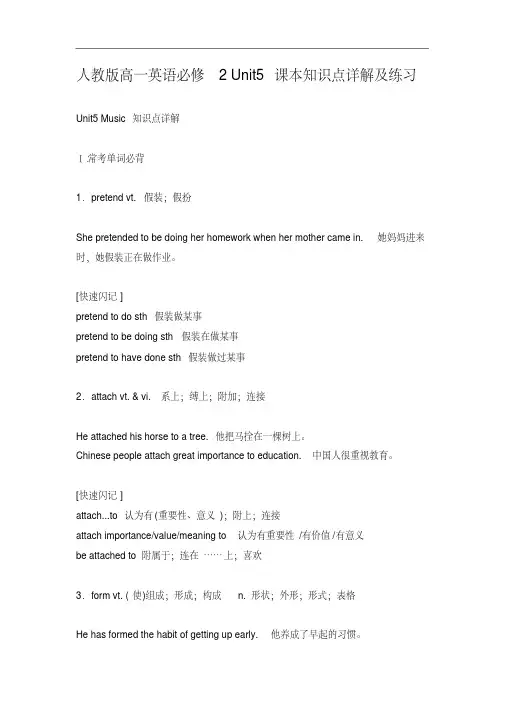
人教版高一英语必修 2 Unit5 课本知识点详解及练习Unit5 Music知识点详解Ⅰ.常考单词必背1.pretend vt. 假装;假扮She pretended to be doing her homework when her mother came in. 她妈妈进来时,她假装正在做作业。
[快速闪记]pretend to do sth 假装做某事pretend to be doing sth 假装在做某事pretend to have done sth 假装做过某事2.attach vt. & vi. 系上;缚上;附加;连接He attached his horse to a tree. 他把马拴在一棵树上。
Chinese people attach great importance to education. 中国人很重视教育。
[快速闪记]attach...to 认为有(重要性、意义);附上;连接attach importance/value/meaning to 认为有重要性/有价值/有意义be attached to 附属于;连在……上;喜欢3.form vt. (使)组成;形成;构成 n. 形状;外形;形式;表格He has formed the habit of getting up early. 他养成了早起的习惯。
[快速闪记]form the habit of... 养成……的习惯in the form of 呈……的形状;以……的形式存在be in good/great form 情绪良好;兴高采烈4.earn vt. 赚;挣得;获得The old man earned his living by selling newspapers. 那位老人通过卖报来谋生。
[快速闪记](1)earn one's respect/reputation 赢得某人尊敬/名誉earn one's living=make a living 谋生(2)earnings n. 所得;收入,工资5. perform vt. & vi. 表演;履行;执行He performed very well in the speech competition. 他在演讲比赛中表现得很好。
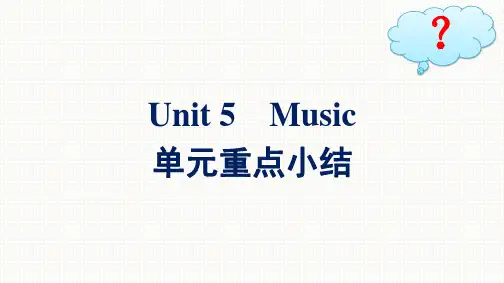
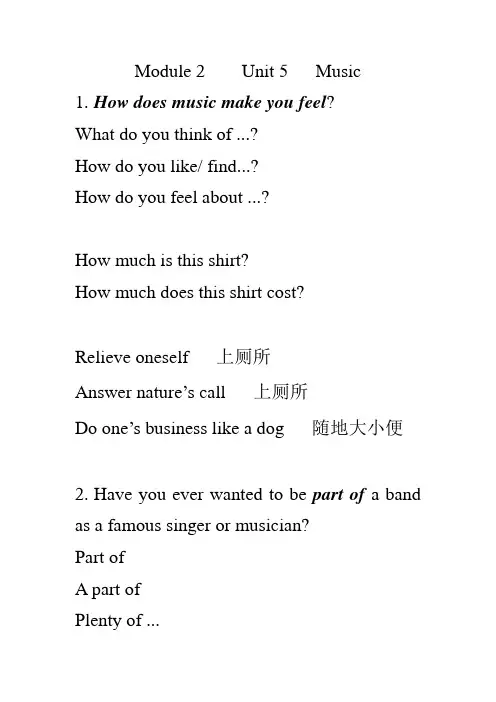
Module 2 Unit 5 Music1.How does music make you feel?What do you think of ...?How do you like/ find...?How do you feel about ...?How much is this shirt?How much does this shirt cost?Relieve oneself 上厕所Answer nature’s call 上厕所Do one’s business like a dog 随地大小便2.Have you ever wanted to be part of a band as a famous singer or musician?Part ofA part ofPlenty of ...Be home to ...泛指为不定冠词(一个或某个)特指为定冠词(这个或那个)零冠词A.固定搭配throw sb into prison 把某人投入监狱相对抽象的行为而非具体事务B.物质名词Water is the source of life.Pen is mightier than sword. 文明胜于刀剑。
C.受形容词修饰依然不带不定冠词的不可数名词news/ fun/ information/ health/ music/ progress/ weather/ luck/ hard work等。
3.Have you ever dreamed of playing in front of thousands of people at a concert, at which everyone is clapping and appreciating yourmusic?介词+ which引导的定语从句At a concertClapThe Concert of Europe 欧洲和谐4.To be honest, a lot of people attach great importance to becoming rich and famous.To be + adj. = adv. + speakingHonestly speakingAttach great importance to ... 认为......很重要Attach 附加;附属Attachment 附件5.They may start as a group of high-school students, for whom practising their music in someone’s house is the first step to fame. NameFamous正迁移DisasterDisastrousNumberNumerouster they may give performances in pubs or clubs, for which they are paid in cash.Pay sb forPay forIn cashBy cheque/ checkOn a loan 贷款Pub 酒馆public house7.The musicians were to play jokes on each other as well as play music, most of whic h was based loosely on the Beatles.Be to do 用途;安排;注定;命令;将来Musician 音乐人8.They put an advertisement in a newspaper looking for rock musiciansPut an advertisement in a newspaperI have learned from the advertisement you put in the local newspaper that ...9.They were so popular that their fans formed clubs in order to get more familiar with them. Form 组成n.表格Fill in the formBe familiar withFamiliarity10.... after a year or so in which they became more serious about their work, the Monkees started to play and sing their own songs like a real band.In a year = after a year= within a year11.They produced a new record,with which they celebrated their former time as a real band.Celebrity 名人With whichCelebrate A with B12.The regulars there were very kind to us.主顾;常客On a regular basis 定期Irregular 不规则的Irregular verbs13.It was almost as exciting as later when we became famous.Almost/ nearlyIt’s almost/ nearly ready. 快好了。
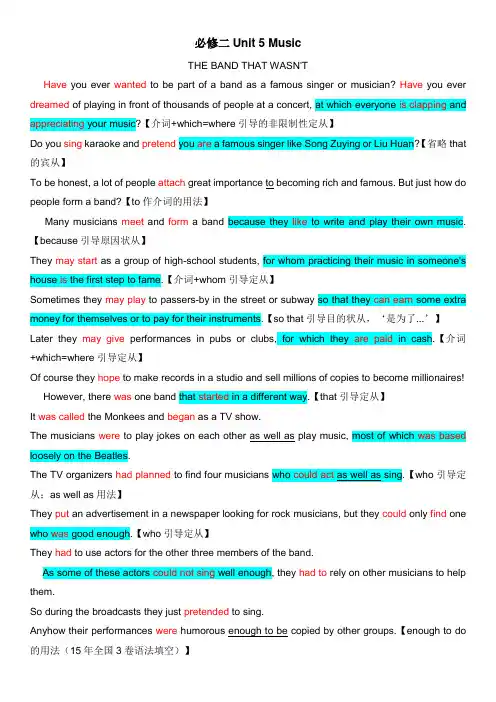
必修二Unit 5 MusicTHE BAND THAT WASN'THave you ever wanted to be part of a band as a famous singer or musician? Have you ever dreamed of playing in front of thousands of people at a concert, at which everyone is clapping and appreciating your music?【介词+which=where引导的非限制性定从】Do you sing karaoke and pretend you are a famous singer like Song Zuying or Liu Huan?【省略that 的宾从】To be honest, a lot of people attach great importance to becoming rich and famous. But just how do people form a band?【to作介词的用法】Many musicians meet and form a band because they like to write and play their own music.【because引导原因状从】They may start as a group of high-school students, for whom practicing their music in someone's house is the first step to fame.【介词+whom引导定从】Sometimes they may play to passers-by in the street or subway so that they can earn some extra money for themselves or to pay for their instruments.【so that引导目的状从,‘是为了...’】Later they may give performances in pubs or clubs, for which they are paid in cash.【介词+which=where引导定从】Of course they hope to make records in a studio and sell millions of copies to become millionaires!However, there was one band that started in a different way.【that引导定从】It was called the Monkees and began as a TV show.The musicians were to play jokes on each other as well as play music, most of which was based loosely on the Beatles.The TV organizers had planned【who引导定从;as well as用法】They put an advertisement in a newspaper looking for rock musicians, but they could only find one who was good enough.【who引导定从】They had to use actors for the other three members of the band.As some of these actors could not sing well enough, they had to rely on other musicians to help them.So during the broadcasts they just pretended to sing.Anyhow their performances were humorous enough to be copied by other groups.【enough to do 的用法(15年全国3卷语法填空)】They were so popular that their fans formed clubs in order to get more familiar with them.【so...that...引导结果状从,‘太...以致于...’(19年全国3卷语法填空)】Each week on TV, the Monkees would play and sing【done作后置定语】However, after a year or so in which they became more serious about their work, the Monkees started to play and sing their own songs like a real band.【in which=when引导定从】Then they produced their own records and started touring and playing their own music.In the USA they became even more popular than the Beatles and sold even more records.The band broke up about 1970, but happily they reunited in the mid-1980s. They produced a new record in 1996, with which they celebrated their former time as a real band.【with+which引导定从】并非乐队的乐队你曾经想过要成为一个乐队里有名的歌手或音乐家吗?你是否曾梦想过在音乐会上面对成千上万的观众演唱,观众欣赏你的歌唱为你鼓掌吗?你唱卡拉OK时是否假装自己就是像宋祖英或刘欢一样著名的歌星吗?说实在的,很多人把名和利看得很重。
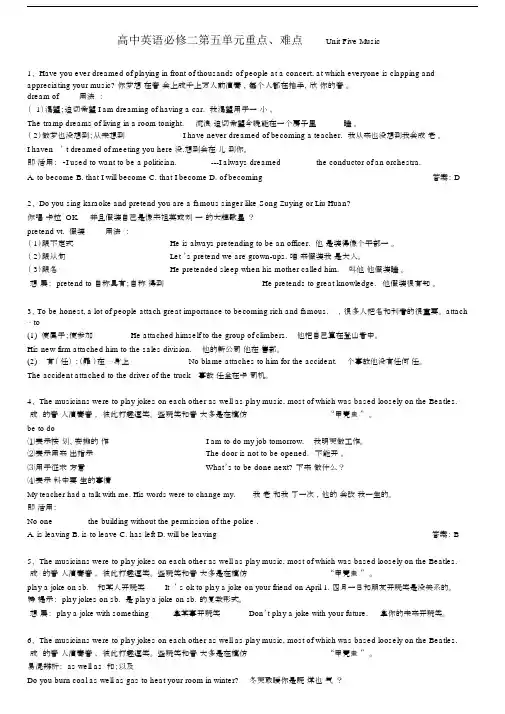
高中英语必修二第五单元重点、难点Unit Five Music1、 Have you ever dreamed of playing in front of thousands of people at a concert, at which everyone is clapping and appreciating your music? 你梦想 在音 会上成千上万人前演奏 ,每个人都在拍手,欣 你的音 。
dream of 用法 :( 1)渴望;迫切希望I am dreaming of having a car. 我渴望用于一 小 。
The tramp dreams of living in a room tonight. 流浪 迫切希望今晚能在一个房子里 ( 2)做梦也没想到;从未想到 I have never dreamed of becoming a teacher.睡 。
我从来也没想到我会成 老 。
I haven ’ t dreamed of meeting you here 没.想到会在 儿 到你。
即 活用: –I used to want to be a politician.---I always dreamed _______ the conductor of an orchestra.A. to becomeB. that I will becomeC. that I becomeD. of becoming答案: D2、 Do you sing karaoke and pretend you are a famous singer like Song Zuying or Liu Huan?你唱 卡拉 OK 并且假装自己是像宋祖英或刘 一 的大牌歌星 ?pretend vt. 假装 用法 :( 1)跟不定式 He is always pretending to be an officer. 他 是装得像个干部一 。
必修5Unit 5First aid要点梳理高效梳理·知识备考●重点单词1〃aid n. & vt.帮助;援助;资助2〃temporary adj.暂时的;临时的3〃injury n.损伤;伤害→injure v.受伤4〃bleed vi. & vt.流血→bled(过去式)→bled(过去分词)5〃choke vi. & vt.(使)噎住;(使)窒息6〃poison n.毒药;毒害vt.毒害;使中毒→poisonous adj.有毒的7〃variety n.变化;多样(化);多变(性)→various adj.各种各样的→vary v.变化8〃mild adj.轻微的;温和的;温柔的→mildly adv.轻微地;温和地9〃swell vi. & vt.(使)膨胀;隆起→swollen adj.肿胀的10〃squeeze vt. & vi.榨;挤;压榨11〃symptom n.症状;征兆12〃pour vt. & vi.倒;灌;注;涌13〃tight adj.牢的;紧的;紧密的→tightly adv.紧地14〃firm adj.(动作)稳定有力的;坚定的→firmly adv.坚固地;稳定地15〃treat vt. & vi.治疗;对待;款待n.款待;招待→treatment n.治疗;疗法;对待;待遇16〃apply vt.涂;敷;搽;应用;运用vi.申请;请求;使用;有效→applicant n.申请人→application n.申请(书)17〃pressure n.压力;挤压;压迫(感)●重点短语1〃first aid急救2〃fall ill 生病3〃prevent...from... 阻止……4〃get burned烧伤5〃electric shock 触电;电休克6〃squeeze out榨出;挤出7〃over and over again反复;多次8〃in place 在适当的位置;适当9〃a number of若干;许多10〃put one’s hands on找到11〃make a difference区别对待;有影响;起(重要)作用●重点句型1〃If burns are on arms or legs, keep them higher than the heart, if possible.若烫伤是在胳膊或腿上,如果可能的话,把它们抬得高于心脏。
必修2Unit 5Music要点梳理高效梳理·知识备考●重点单词1.roll vt. & vi. 滚动;(使)摇摆n.摇晃;卷;卷形物;面包圈2.pretend vt.假装;假扮3.attach vt. & vi.系上;缚上;附加;连接4.form vt.(使)组成;形成;构成5.earn vt.赚;挣得;获得6.instrument n.工具;器械;乐器7.passer by n.过路人;行人→passers by (pl.)8.perform vt. & vi.表演;履行;执行→performance n.表演;演奏9.broadcast n.广播;播放vi. & vt.广播;播放10.humorous_ adj.幽默的→humor n.幽默11.familiar adj.熟悉的;常见的;亲近的12.attractive adj.吸引人的;有吸引力的→attract vt.吸引→attraction n.吸引,吸引力13.afterwards adv.然后;后来14.sensitive adj.敏感的;易受伤害的;灵敏的15.confident adj.自信的;确信的→confidence n.自信●重点短语1.dream of梦见;梦想2.to be honest 说实在的3.attach...to附上;认为有(意义)4.in cash 用现金5.play jokes on戏弄6.rely on依靠;依赖7.be/get familiar with熟悉8.or so大约9.break up打碎;分裂10.in addition 另外,也11.sort out分类12.above all 最重要;首先13.be based on以……为基础14.be serious about对……认真15.by cheque 用支票16.stick to坚持●重点句型1.Freddy and his band could not go out anywhere without being followed弗雷迪和他的乐队走到哪里都会有人跟随。
2.At last feeling very upset and sensitive,_Freddy and his band realized that they must leave the country before it became too painful for them.最后,由于深感苦恼,神经高度紧张,弗雷迪和他的乐队意识到他们必须在自己感到太痛苦之前离开这个国家。
3.Music is more than just sound.音乐决不仅仅是声音。
●高考范文(2009·广东卷)你是校报小记者,最近进行了一次采访。
以下是这次采访的情况:时间:上周末对象:眼科医生(eye-doctor)王教授主题:我国中小学生近视(short-sightedness)问题基本信息:(1)发生率:略高于50%(2)人数:世界第一专家解读:(1)原因:很复杂(2)治疗:没有哪一种药物能治愈近视(3)建议:不要过度用眼;多参加户外活动(4)特别提示:如何握笔也和近视有关__________________________________________________________________________________[范文]Last weekend, I had an interview with Professor Wang, an eye-doctor, concerning the issue of short-sightedness of school children in China. According to Professor Wang, slightly more than half of the school children in our country are short-sighted, ranking the first in the world. He also pointed out that the causes of short-sightedness are so complicated that no medicine can cure short -sightedness. He suggested that school children avoid overuse of their eyes and do more outdoor activities. He particularly reminded us that how to hold a pen is also related to short-sightedness.考点探究互动探究·能力备考Ⅰ.词汇短语过关1.pretend vt. 假装;假扮pretend sth. 伪称某事物(尤用做借口)pretend to do...假装做……pretend to be+n. (adj.) 假装是……pretend to be doing...假装正在做……pretend to have done... 假装已做……pretend that-clause 假装……[即学即练1](1)He _______________________ yesterday.昨天他假装头疼。
(2)We mustn't _______________________ what we don't know.我们不应不懂装懂。
(3)He _______________________________ when he met a bear.当他遇到熊时就装死。
pretended a headachepretend to knowpretended to be dead2.attach vt. 系;贴;附加;认为有(重要性等)attached adj. 依恋的,留恋的attachment n. [C]附件[C,U]依恋;眷恋;深爱attach sth. to sth. 把某物系到某物上attach yourself to sb./sth. 参加,和……在一起attach to sb./sth.与……有联系,与……有关联be attached to sb./sth. 依恋,留恋[即学即练2](1)She __________ a cheque ____ the order form.她在订货单上附了一张支票。
(2)Don't worry—there are no strings _____________.不用担心——没有附加的条件。
(3)She ____________________________ the regular exercise.她对常规训练极为重视。
(4)No blame __________________ him for the accident.这次事故的责任与他无关。
(5)I am deeply _____________________ this novel.我非常喜欢这部小说。
attachedtoattachedattaches great importance toattaches toattached to3.form vt. & vi. 形成;组织;养成;培养n. 形式;表格;形状,外形;状况;精神form(=set up) a club 成立俱乐部form a good habit 养成好习惯form the habit of=fall/get into the habit of养成……的习惯form an organization 成立一个组织fill in the form 填表格in the form of 以……的形式in/out of form 状况良好/不佳[即学即练3](1)The footballer's been ________________.这个足球运动员的状态不好。
(2)He is ____________ the application ______.他正在填申请表。
(3)His research ______ the basis of the new book.他的研究成果是这本新书的基础。
(4)The teacher ______ the students ______ a line.老师让学生排成一行。
out of formfilling informformedformedinto4.earn vt. 赚得;挣得;获得earn one's living=make a living 谋生earn one's own living 自食其力earn money=make money 挣钱[即学即练4](1)His courage ______________________of his classmates.他的勇敢博得了同学们的赞扬。
(2)Do you know how much he ___________ a month?你知道他一个月赚多少钱吗?(3)He _________________________ by teaching at a language school.他在语言学校教书以维持生计。
earned him the admirationearnsearns his living5.perform vt.&vi 表演;履行;执行performance n. 履行,执行;表演performer n. 执行者;表演者perform one's promise 守信;履行诺言perform duty 尽职perform a part in... 在……中扮演角色perform an experiment 做实验give/put on a performance 演出[即学即练5](1)The students will ___________________ next Friday.这些学生下星期五将演出一场歌剧。
(2)The police _________________________ in our society.警察在我们的社会中起着极其重要的作用。
(3)You shall _________________________ the way they do.你们要按照他们的方法去做实验。
(4)Our team _______________ in the match.我们队在比赛中表现很出色。